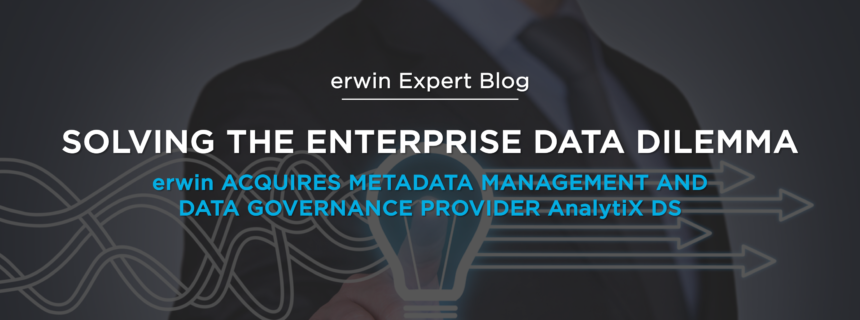Solving the Enterprise Data Dilemma

Due to the adoption of data-driven business, organizations across the board are facing their own enterprise data dilemmas.
This week erwin announced its acquisition of metadata management and data governance provider AnalytiX DS. The combined company touches every piece of the data management and governance lifecycle, enabling enterprises to fuel automated, high-quality data pipelines for faster speed to accurate, actionable insights.
Why Is This a Big Deal?
From digital transformation to AI, and everything in between, organizations are flooded with data. So, companies are investing heavily in initiatives to use all the data at their disposal, but they face some challenges. Chiefly, deriving meaningful insights from their data – and turning them into actions that improve the bottom line.
This enterprise data dilemma stems from three important but difficult questions to answer: What data do we have? Where is it? And how do we get value from it?
Large enterprises use thousands of unharvested, undocumented databases, applications, ETL processes and procedural code that make it difficult to gather business intelligence, conduct IT audits, and ensure regulatory compliance – not to mention accomplish other objectives around customer satisfaction, revenue growth and overall efficiency and decision-making.
The lack of visibility and control around “data at rest” combined with “data in motion”, as well as difficulties with legacy architectures, means these organizations spend more time finding the data they need rather than using it to produce meaningful business outcomes.
To remedy this, enterprises need smarter and faster data management and data governance capabilities, including the ability to efficiently catalog and document their systems, processes and the associated data without errors. In addition, business and IT must collaborate outside their traditional operational silos.
But this coveted state of data nirvana isn’t possible without the right approach and technology platform.

Enterprise Data: Making the Data Management-Data Governance Love Connection
Bringing together data management and data governance delivers greater efficiencies to technical users and better analytics to business users. It’s like two sides of the same coin:
- Data management drives the design, deployment and operation of systems that deliver operational and analytical data assets.
- Data governance delivers these data assets within a business context, tracks their physical existence and lineage, and maximizes their security, quality and value.
Although these disciplines approach data from different perspectives and are used to produce different outcomes, they have a lot in common. Both require a real-time, accurate picture of an organization’s data landscape, including data at rest in data warehouses and data lakes and data in motion as it is integrated with and used by key applications.
However, creating and maintaining this metadata landscape is challenging because this data in its various forms and from numerous sources was never designed to work in concert. Data infrastructures have been cobbled together over time with disparate technologies, poor documentation and little thought for downstream integration, so the applications and initiatives that depend on data infrastructure are often out-of-date and inaccurate, rendering faulty insights and analyses.
Organizations need to know what data they have and where it’s located, where it came from and how it got there, what it means in common business terms [or standardized business terms] and be able to transform it into useful information they can act on – all while controlling its access.
To support the total enterprise data management and governance lifecycle, they need an automated, real-time, high-quality data pipeline. Then every stakeholder – data scientist, ETL developer, enterprise architect, business analyst, compliance officer, CDO and CEO – can fuel the desired outcomes with reliable information on which to base strategic decisions.
Enterprise Data: Creating Your “EDGE”
At the end of the day, all industries are in the data business and all employees are data people. The success of an organization is not measured by how much data it has, but by how well it’s used.
Data governance enables organizations to use their data to fuel compliance, innovation and transformation initiatives with greater agility, efficiency and cost-effectiveness.
Organizations need to understand their data from different perspectives, identify how it flows through and impacts the business, aligns this business view with a technical view of the data management infrastructure, and synchronizes efforts across both disciplines for accuracy, agility and efficiency in building a data capability that impacts the business in a meaningful and sustainable fashion.
The persona-based erwin EDGE creates an “enterprise data governance experience” that facilitates collaboration between both IT and the business to discover, understand and unlock the value of data both at rest and in motion.
By bringing together enterprise architecture, business process, data mapping and data modeling, erwin’s approach to data governance enables organizations to get a handle on how they handle their data. With the broadest set of metadata connectors and automated code generation, data mapping and cataloging tools, the erwin EDGE Platform simplifies the total data management and data governance lifecycle.
This single, integrated solution makes it possible to gather business intelligence, conduct IT audits, ensure regulatory compliance and accomplish any other organizational objective by fueling an automated, high-quality and real-time data pipeline.
With the erwin EDGE, data management and data governance are unified and mutually supportive, with one hand aware and informed by the efforts of the other to:
- Discover data: Identify and integrate metadata from various data management silos.
- Harvest data: Automate the collection of metadata from various data management silos and consolidate it into a single source.
- Structure data: Connect physical metadata to specific business terms and definitions and reusable design standards.
- Analyze data: Understand how data relates to the business and what attributes it has.
- Map data flows: Identify where to integrate data and track how it moves and transforms.
- Govern data: Develop a governance model to manage standards and policies and set best practices.
- Socialize data: Enable stakeholders to see data in one place and in the context of their roles.
An integrated solution with data preparation, modeling and governance helps businesses reach data governance maturity – which equals a role-based, collaborative data governance system that serves both IT and business users equally. Such maturity may not happen overnight, but it will ultimately deliver the accurate and actionable insights your organization needs to compete and win.
Your journey to data nirvana begins with a demo of the enhanced erwin Data Governance solution. Register now.
The Most Comprehensive Data Management and Data Governance Solution
We've enhanced the erwin edge platform with the broadest set of metadata connectors and automated code generation, data mapping and cataloging tools.
Learn More
